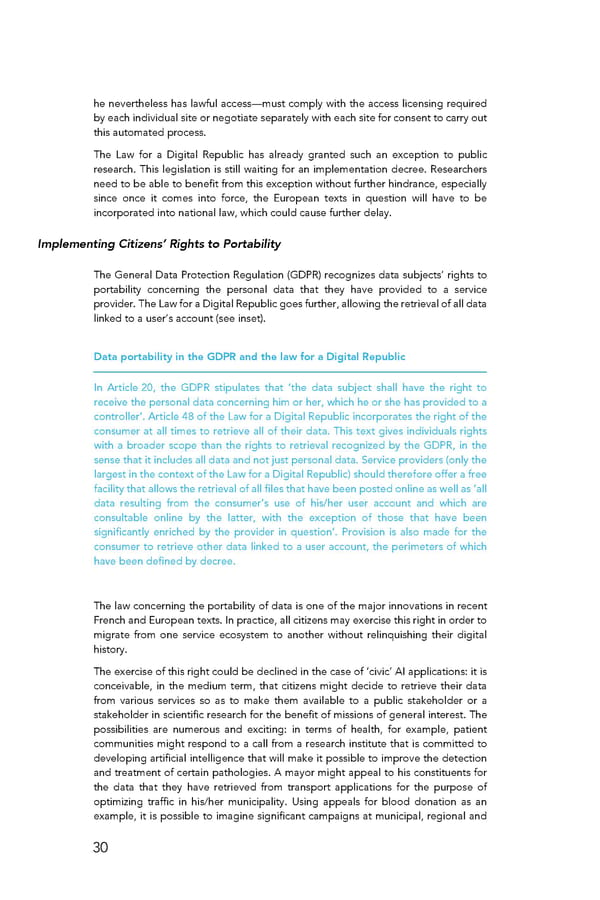he nevertheless has lawful access—must comply with the access licensing required by each individual site or negotiate separately with each site for consent to carry out this automated process. The Law for a Digital Republic has already granted such an exception to public research. This legislation is still waiting for an implementation decree. Researchers need to be able to benefit from this exception without further hindrance, especially since once it comes into force, the European texts in question will have to be incorporated into national law, which could cause further delay. Implementing Citizens’ Rights to Portability The General Data Protection Regulation (GDPR) recognizes data subjects’ rights to portability concerning the personal data that they have provided to a service provider. The Law for a Digital Republic goes further, allowing the retrieval of all data linked to a user’s account (see inset). Data portability in the GDPR and the law for a Digital Republic In Article 20, the GDPR stipulates that ‘the data subject shall have the right to receive the personal data concerning him or her, which he or she has provided to a controller’. Article 48 of the Law for a Digital Republic incorporates the right of the consumer at all times to retrieve all of their data. This text gives individuals rights with a broader scope than the rights to retrieval recognized by the GDPR, in the sense that it includes all data and not just personal data. Service providers (only the largest in the context of the Law for a Digital Republic) should therefore offer a free facility that allows the retrieval of all files that have been posted online as well as ‘all data resulting from the consumer’s use of his/her user account and which are consultable online by the latter, with the exception of those that have been significantly enriched by the provider in question’. Provision is also made for the consumer to retrieve other data linked to a user account, the perimeters of which have been defined by decree. The law concerning the portability of data is one of the major innovations in recent French and European texts. In practice, all citizens may exercise this right in order to migrate from one service ecosystem to another without relinquishing their digital history. The exercise of this right could be declined in the case of ‘civic’ AI applications: it is conceivable, in the medium term, that citizens might decide to retrieve their data from various services so as to make them available to a public stakeholder or a stakeholder in scientific research for the benefit of missions of general interest. The possibilities are numerous and exciting: in terms of health, for example, patient communities might respond to a call from a research institute that is committed to developing artificial intelligence that will make it possible to improve the detection and treatment of certain pathologies. A mayor might appeal to his constituents for the data that they have retrieved from transport applications for the purpose of optimizing traffic in his/her municipality. Using appeals for blood donation as an example, it is possible to imagine significant campaigns at municipal, regional and 30
 For a Meaningful AI - Report Page 30 Page 32
For a Meaningful AI - Report Page 30 Page 32